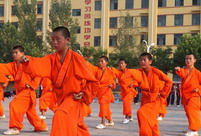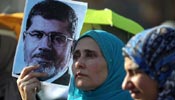 Chinese Air Force's combat group organizes actual-combat training
Chinese Air Force's combat group organizes actual-combat training Street fitness instructor
Street fitness instructor
 Couples from 56 ethnic groups create new Guinness record of proposal
Couples from 56 ethnic groups create new Guinness record of proposal
 Pakistan celebrates Independence Day
Pakistan celebrates Independence Day
 Collective wedding ceremony for 'Beijing drifters’ held in Happy Valley
Collective wedding ceremony for 'Beijing drifters’ held in Happy Valley
 An antique camera collector in Tianjin
An antique camera collector in Tianjin
 Protests held in Gaza, Jordan to support Egyptian people
Protests held in Gaza, Jordan to support Egyptian people
 China Beijing Int'l Gifts, Premium&Houseware Exhibition opens
China Beijing Int'l Gifts, Premium&Houseware Exhibition opens
 Joey Yung's new album cover released
Joey Yung's new album cover released
China protests Japanese politicians' pilgrimage to Yasukuni war shrine
Japanese Prime Minister Shinzo Abe, whose hawkish views have raised concerns in the region, broke with two decades of tradition on Thursday by omitting any expression of remorse for Japan's past aggression in Asia on the 68th anniversary of its World War II surrender.
In a speech, he avoided words such as "profound remorse" and "sincere mourning" used by his predecessors to acknowledge the suffering caused by the Imperial Japanese Army as it stormed across East Asia.
He has previously expressed unease over Japan's apologies for wartime aggression.
Abe stayed away from the controversial Yasukuni Shrine, which honors Japan's war dead, including 14 Class A war criminals from World War II. But he sent a ceremonial gift to the shrine, bearing his name and title as head of the Liberal Democratic Party.
At a time when Japan is witnessing an unprecedented surge of nationalism that is downplaying its past militarism, three of Abe's cabinet members — Keiji Furuya, state minister in charge of the abduction issue, Yoshitaka Shindo, internal affairs and communications minister, and Tomomi Inada, administrative reform minister — made their pilgrimage to the shrine, together with 102 Diet members.
 |
 Helicopters, tanks seen during China-Russia joint drill
Helicopters, tanks seen during China-Russia joint drill Conjoined twins separated in groundbreaking surgery
Conjoined twins separated in groundbreaking surgery Summer photos of Zhang Xinyi, how graceful
Summer photos of Zhang Xinyi, how graceful  Pakistan celebrates Independence Day
Pakistan celebrates Independence Day Beijing Int'l Gifts, Premium & Houseware Exhibition opens
Beijing Int'l Gifts, Premium & Houseware Exhibition opens Kung Fu soccer team trains at Songshan Shaolin training base
Kung Fu soccer team trains at Songshan Shaolin training base  Air Force's combat group conducts flight training in joint drills
Air Force's combat group conducts flight training in joint drills Protests held in Gaza, Jordan to support Egyptian people
Protests held in Gaza, Jordan to support Egyptian people Various sun protective outfits
Various sun protective outfits Jaguar Land Rover to recall 11,852 cars
Jaguar Land Rover to recall 11,852 cars In sports arena, you are my greatest rival!
In sports arena, you are my greatest rival! Top 10 fatal vipers on earth
Top 10 fatal vipers on earth Day|Week|Month